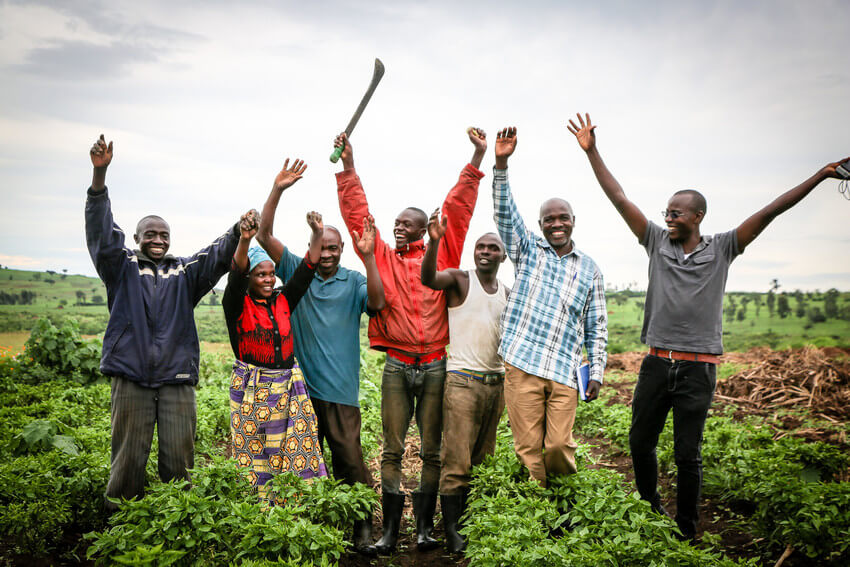Trends to watch as Africa seeks to increase food production and climate-proof its agriculture sector will include new technologies and information sharing, researchers and agencies say.
One of the numerous factors that have hindered Africa’s millions of strong smallholders and subsistence farmers is the lack of information, a point reiterated in multiple studies.
Moving forward from COP28, agencies such as the Food and Agriculture Organisation (FAO) predict that information and innovation will dominate agriculture in 2024.
Beyond the usual climate hot buttons such as emissions, mitigation, adaptation, loss and damage, FAO says artificial intelligence and the role of nuclear science are among some of the most urgent issues that will play an increasing role in the future of global food production.
Research and innovations are pivotal for African countries; they will drive and improve the sector despite years of struggling efforts to secure financial support.
The continent is already dealing with electricity challenges that have had a negative impact on agriculture. New investments in nuclear and other clean energy projects will change the characteristics of Africa’s food production.
The International Energy Agency forecasts that renewable energy “capacity will triple by 2030 led by solar and wind, complemented by growth in nuclear”.
This is expected to further raise electricity generation from 71% in 2030 to 100% in 2050.
Experts say Africa should not be left behind in that ambitious growth if the continent’s agriculture is also to grow.
In an era where Artificial Intelligence (AI) is dominating international conversations across various sectors, including health and daily interactions, the role of AI in shaping African agriculture has become a focal point in the continent’s aspirations for food security.
At COP28, FAO said that there is a need to transform global food systems in the face of climate change and also address gaps and challenges in food production efforts.

Nuclear plant in South Africa. Source: Online
It is one of the issues discussed at several side events organised by FAO at COP28, emphasising new approaches to agriculture and climate resilience at a time when poor countries have been left behind by technological advances.
FAO organised the “Launch of the High-level Panel Investment Action Plan and Financing Dialogue” which focused “on identifying key finance, policy, innovation, and knowledge interventions that would enhance climate resilience and adaptation on the continent”.
The World Food Programme (WFP) has also added its voice to the urgency of innovation, identifying this as one of the major responses to climate change.
At COP28, WFP organised the Innovation 4 Adaptation: Tackling the Climate and Hunger Emergencies, which invited “participants to engage with and support innovative solutions and approaches for reducing hunger and promoting climate-sensitive food security and climate adaptation measures”.
This has become even more pertinent for African countries emerging from a cycle of climate-related weather changes that have upended food production.
One of the areas that have become a focal point is Africa’s usually unreliable weather forecasts and early warning systems that have wreaked havoc on agriculture. It is one of the areas that emerged at COP28.
For perspective, the United States is reported to have hundreds of local weather stations that allow localised monitoring, but some African countries are lucky if they have more than five serving the whole country.

Young farmers are expected to play an increased role in innovation and technology. Source: Online
According to economist Michael Kremer’s Innovation Commission for Climate Change (Food Security and Agriculture), some of the areas that need attention include: “Helping farmers and communities implement better rainwater harvesting, lowering the cost of digital agriculture that can help farmers use irrigation, fertiliser and pesticides most efficiently, encouraging production of alternative proteins to reduce demand for livestock, and providing insurance and other social protections to help farmers recover from extreme weather events.”
The Innovation Commission’s brief is to promote “innovation development and scaling at the intersection of climate change, food security, and agriculture”. These are precisely the areas that have always lagged, as governments struggle to pool resources to meet those needs, and it is hoped that international agriculture finance will help meet these goals.
It is estimated that by 2050, one in four people in the world will be living on the African continent, highlighting the need for the continent to be able to feed itself, and also addressing the areas of concern raised by researchers and agencies.









